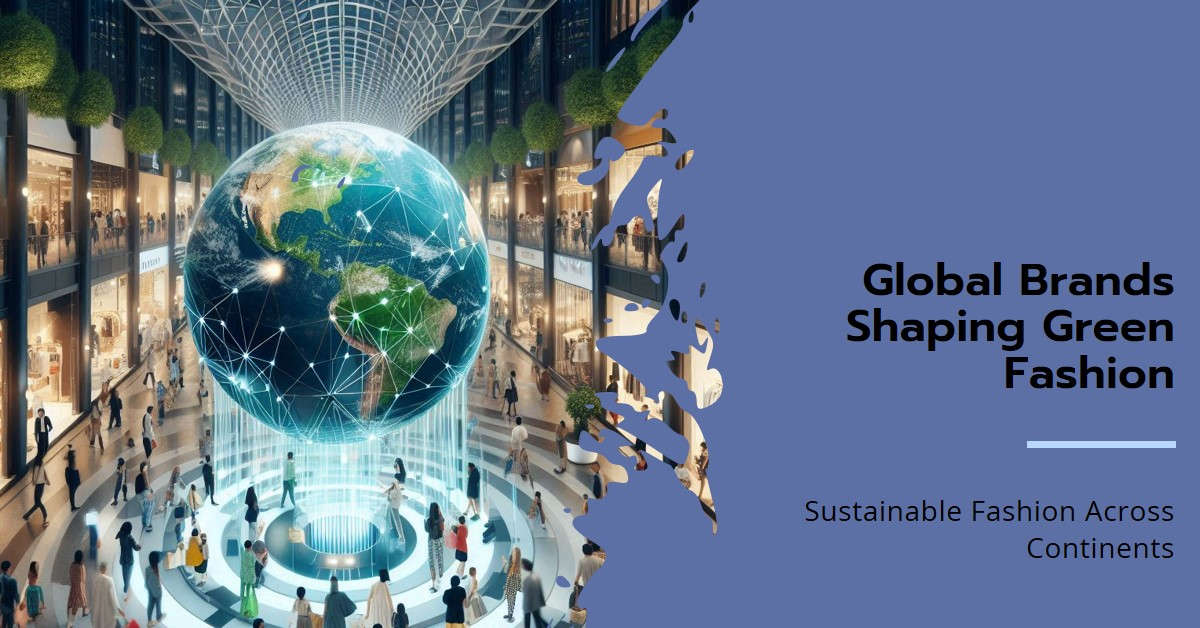The fashion industry, once synonymous with rapid consumption and waste, is undergoing a significant transformation in 2024. As sustainability becomes a global brands priority, fashion giants across Europe, Asia, and the Americas are embracing eco-conscious practices. From innovative fabrics to circular fashion systems, the drive for sustainable fashion trends in 2024 is reshaping how clothes are produced, marketed, and consumed globally.
This article explores how different regions are adapting to the green fashion revolution, highlighting key brands and initiatives that are setting the tone for the future of fashion.
The Global Shift Toward Sustainable Fashion

In recent years, consumers have become increasingly aware of the environmental impact of fashion. The industry is responsible for roughly 10% of global carbon emissions, and fast fashion contributes significantly to pollution, water waste, and unethical labor practices. The push for sustainable fashion is not just a trend but a necessary response to a growing crisis.
Fashion brands worldwide are rethinking their production processes, material choices, and business models to reduce their ecological footprint. In 2024, sustainability in fashion is no longer an option but a business imperative. Let’s examine how brands across different continents are leading the way.
Europe: Pioneering Ethical Fashion Practices
1. Circular Fashion in Scandinavia
Europe has long been at the forefront of sustainable fashion, and Scandinavian countries continue to lead with their focus on circular fashion. Circular fashion promotes designing clothes for longevity, encouraging reuse, and recycling. Swedish brand H&M, for example, has expanded its Garment Collection Program, encouraging customers to recycle old clothes at stores for discounts. H&M is also investing in sustainable fabrics, such as those made from agricultural waste or recycled textiles, positioning itself as a leader in green fashion.
Similarly, Danish fashion brand GANNI has introduced several circular initiatives, including renting out collections and offering take-back schemes to recycle garments. GANNI has also reduced its carbon emissions through local production and use of certified eco-friendly materials.
2. France: Luxury Meets Sustainability
France, known for its luxury fashion houses, is incorporating sustainability into the high-end market. In 2024, brands like Chanel and Louis Vuitton are adopting eco-friendly practices without compromising their prestigious images. Chanel has pledged to reduce carbon emissions by integrating organic cotton and bio-based fabrics into its collections. It also invests in research to develop sustainable alternatives to traditional materials like leather.
Louis Vuitton, another iconic French brand, has embraced eco-consciousness with its “Upcycling Capsule Collection,” where it reuses materials from unsold products to create new designs. This aligns with the global trend of reducing waste and enhancing the lifecycle of fashion products.
3. United Kingdom: Transparency in Supply Chains
The fashion industry in the United Kingdom is increasingly focused on transparency, ensuring that customers know exactly how and where their clothes are made. Brands like Stella McCartney and Vivienne Westwood continue to push for ethical production processes. Stella McCartney, a pioneer in sustainable fashion, uses vegan leather, organic cotton, and regenerative farming techniques.
The UK is also a hub for fashion technology, with brands leveraging AI to track the sustainability of their supply chains. This allows brands to measure their carbon footprint and report it transparently to consumers. Transparency, coupled with innovation, is pushing British fashion toward a greener future.
Asia: A Growing Focus on Sustainability in Fashion
1. Japan: Traditional Craft Meets Modern Sustainability
Japan’s fashion industry is a unique blend of tradition and modernity. Japanese designers are increasingly turning to slow fashion, a movement that promotes mindful production and consumption, rooted in the country’s deep respect for craftsmanship. Brands like Issey Miyake and UNIQLO are spearheading efforts to reduce waste and use sustainable materials.
In 2024, UNIQLO expanded its sustainability initiatives, launching its RE.UNIQLO program, where customers can return used clothing for recycling. The company also focuses on producing high-quality, long-lasting garments, moving away from fast fashion’s disposable mindset.
2. India: A Commitment to Ethical Textiles
India, a major textile producer, is emphasizing ethical production and sustainable materials in 2024. Indian fashion brands like FabIndia and Ritu Kumar have long championed traditional, handwoven textiles, which are inherently eco-friendly. These brands promote the use of natural dyes, organic cotton, and support artisanal communities.
India’s push for sustainable fashion is also driven by government regulations aimed at reducing the environmental impact of the textile industry. For instance, the Sustainable Textile Initiative supports the transition to greener production methods, encouraging businesses to adopt water-saving technologies and reduce chemical waste.
3. China: Greening the Fast Fashion Market
China, a major player in the fast fashion industry, has begun shifting toward sustainability in recent years. In 2024, Chinese brands like Peacebird and Li-Ning are incorporating recycled materials into their designs and focusing on reducing waste in production processes.
Additionally, China is home to emerging eco-friendly fashion tech, where innovations such as smart fabrics and biodegradable clothing are being developed to reduce the environmental burden of mass production. The Chinese government is also playing a role by setting stricter environmental regulations for textile and fashion industries.
Americas: Eco-Conscious Fashion on the Rise
1. United States: Tech-Driven Sustainability
In the United States, technology and sustainability go hand in hand. Brands like Patagonia and Everlane have become synonymous with sustainable fashion, pioneering efforts in transparency, ethical sourcing, and recycling. Patagonia, for example, encourages customers to repair, recycle, or trade in used gear as part of its Worn Wear program, aiming to reduce waste and extend the life of its products.
In 2024, the U.S. fashion industry is also embracing sustainable textiles. Innovators are experimenting with new materials, such as mycelium-based leather, made from mushrooms, and lab-grown fabrics that minimize environmental impact. The growing demand for ethical fashion has pushed American brands to adopt more sustainable production methods, while consumers increasingly prioritize eco-friendly options.
2. Brazil: Sustainable Fashion from the Rainforest
Brazil, home to the Amazon rainforest, is uniquely positioned to influence global fashion through its rich biodiversity. Brazilian designers are increasingly using sustainable fabrics made from local, renewable resources, such as organic cotton and natural rubber. Brands like Osklen are leading the charge, emphasizing sustainable practices from sourcing materials to manufacturing.
In 2024, Brazilian fashion is also contributing to conservation efforts, with a growing number of designers using their platforms to raise awareness about deforestation and climate change. Brazil’s focus on environmental preservation is deeply tied to its fashion industry’s sustainability goals.
3. Canada: Ethical Fashion for a New Generation
Canadian fashion is marked by a commitment to ethical sourcing and sustainable business models. Brands like Frank and Oak and Kotn are dedicated to reducing their carbon footprints through energy-efficient production and the use of organic materials. Frank and Oak, for example, has implemented an Eco-Packaging initiative, ensuring that all shipping materials are recyclable or compostable.
In 2024, Canadian brands are also exploring circular fashion, where clothing is designed to be reused or recycled, reducing waste and promoting longevity. The rise of sustainable fashion brands in Canada is largely driven by consumer demand for eco-conscious options.
Global Collaboration and the Future of Green Fashion
As the fashion industry evolves, one of the most promising developments in 2024 is the growing collaboration between global brands, governments, and NGOs to push sustainability initiatives forward. Fashion industry reports indicate that consumers are increasingly opting for sustainable options, and fashion houses are responding with innovative solutions.

NGOs like the Sustainable Apparel Coalition are working with brands worldwide to adopt sustainable practices and improve the environmental and social impacts of fashion production. These partnerships are critical for ensuring that the fashion industry can meet the challenges posed by climate change and resource scarcity.
In addition, global fashion brands are embracing circular economy models, which promote the reuse, recycling, and repair of garments. This shift away from linear consumption patterns, where clothes are disposed of after a short period, is essential for reducing waste and minimizing the environmental impact of fashion.
Conclusion: The Future of Sustainable Fashion
The fashion industry in 2024 is at a crossroads, with sustainability at the heart of its future. From Europe’s luxury brands embracing eco-conscious practices to Asia’s focus on slow fashion and the Americas’ tech-driven innovations, the push for green fashion brands globally is reshaping the way clothes are made and consumed.
As consumer demand for ethical fashion grows, the pressure on global brands to adopt sustainable practices will only increase. The future of fashion lies in the balance between innovation, tradition, and sustainability, with brands worldwide striving to create a fashion industry that benefits both people and the planet.
For more insights on global trends in sustainable fashion, visit Epic Infinite’s in-depth coverage of fashion and sustainability.
#epicinfinite #epicarticle #epicblog
External Resources:
- Sustainable Apparel Coalition – Global organization driving sustainable production practices in fashion.
- Patagonia’s Worn Wear – Initiative encouraging customers to recycle or trade in used Patagonia gear.
- Circular Fashion Initiative – A movement advocating for the reuse and recycling of garments to reduce waste.










